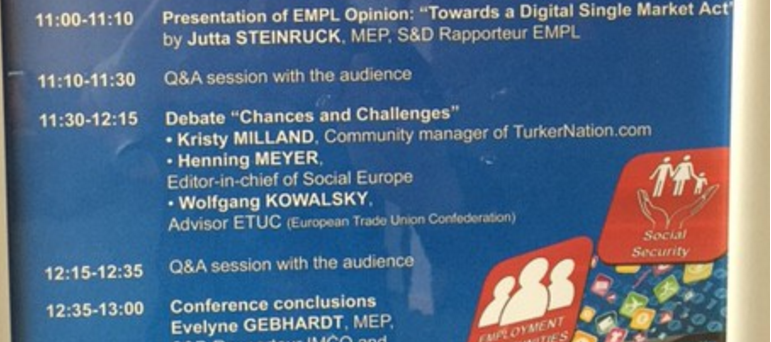Employment and social security in the digital economy

On the invitation of Jutta Steinruck, German MEP and Rapporteur for the Committee on Employment and Social Affairs for the opinion on ‘Towards a Digital Single Market’, the EFJ participated in a conference on “Employment and social security in the Digital Single Market: Chances and Challenges”.
“We may move towards a trend of casualisation threatening collective bargaining and freedom of association,with increasingly outsourced work”, warned Valerio de Stefano from the International Labour Organisation (ILO). The more important it is for unions to organise in the digital economy, to advocate for fundamental rights for all workers and for companies to be transparent. Employers have to be reminded of their information and consultation duties when out-sourcing. He said that ratings not only for online workers’ performance but for employers’ social responsibility are crucial.
Ursula Huws, University of Hertfordshire, and responsible for a European project on “The Dynamics of Virtual Work” (COST Action IS 1202), in which the EFJ participates in, warned that Europe is moving towards a new model of employment, in which right now the risks prevail the opportunities: Risks regarding quality, training, working time, health & safety and social security. “Zero hours” contracts in the UK have doubled in the last year, “crowd-sourcing becomes a test bird”, she said. How can freelances survive in a media sector, where online news are expected to get for free, she asked the audience. Huws proposed to use technology to set up local services on non-profit basis to make sure that employment schemes are protected and transparency is growing in this grey sector.
Kristy Milland, Community manager of Turkernation.com from Canada, referred to the crucial role of unions organising this dispersed sector. She agreed that transparency is a sine qua non to make communication among workers possible and create cooperative platforms.
Wolfgang Kowalsky, European Trade Union Confederation, also stressed the importance of information and consultation rights for workers and unions in the digital economy. In order to shape digital work positively, the Social partners must be involved, he said. Working time (work-life balance),employees’ data protection are only two important aspects. He noted that there is a lack of IT students in Europe. “There is a great need to make the sector more attractive and drive it positively forwards”, he said. He urged the European institutions to continue the work in this field and create a European Forum in order to shape the policy for the future on all relevant levels, and not only the technological driven one dominant in Europe at the moment.
https://twitter.com/JuttaSteinruck/status/657103394587430913
Jutta Steinruck’s is available here.
The EFJ Digital Media Expert Group will have its next meeting in Brussels on 29. October






